I’ve been on a bit of a Tarkovsky bender lately. I’m not entirely sure why—it just seems like suddenly on Twitter and among my friends his work keeps coming up. I got to write about Solaris for its 50th anniversary, and in my research for that article, I learned that novelist and critic Geoff Dyer wrote a book-length essay on Stalker.
Since the pandemic started, and for many disparate reasons, I’ve made a habit of leaning into my more obsessive tendencies, partly to dig a bit into my own personality and tastes, partly because I keep making “jokes” about how I’m interested to find out who the hell I am once the pandemic is over, but, well, who knows when that will be? I might as well try to figure out who I am now. And partly (though I hate to admit it) because I genuinely think the world is ending, so I’ve been trying to be as present as possible for the last few years, and to give myself what I want as much as possible, just in case I’m not present at all in the near future.
Hm. Reading all of that back the Tarkovsky thing begins to make sense?
This is my longwinded way of saying that when I saw that someone had written a whole book about their feelings about Stalker, I ordered it within five minutes.
I’ve read one of Dyer’s previous books, Out of Sheer Rage, and I had a similar reaction to his take on Stalker as I did to that book. It’s hard to summarize, but basically for me reading Dyer is a rollercoaster of yelling “Yes, exactly!” at the book, and then, sometimes a mere paragraph later, yelling “What? NO.” It’s a fascinating reading experience, and definitely one of the reasons I was excited for this book.
I extremely, violently disagree with a lot of the stuff in here. And yet Dyer also says some of the truest things I’ve read about Tarkovsky.
Buy the Book


Zona
For instance, this, on how Tarkovsky filmed landscapes: “Landscapes like this had been seen before Tarkovsky but—I don’t know how else to put it—their beingness had not been seen in this way. Tarkovsky reconfigured the world, brought this landscape—this way of seeing the world—into existence.” Or this, on the scene of Stalker’s return to the Zone:
The smell of flowers may have gone but, unlike Gatsby, who is forced to accept the colossal vitality of his illusion, Stalker is still able to believe, to give himself to the idea of perfection. He may not be holding his hands together and muttering verses from some sacred text but for Stalker the rapture he feels at this moment is a form of prayer as defined by William James in The Varieties of Religious Experience: “the soul putting itself in a personal relations with the mysterious power of which it feels the presence.”
He also says one of the most intelligent things about faith I’ve ever heard anyone say:
For Tarkovsky the artist, despite his Russian Orthodox Christian faith, despite his insistence that the epic scenery of Utah and Arizona could only have been created by god, it is an almost infinite capacity to generate doubt and uncertainty (and, extrapolating from there, wonder)…The story of [Stalker’s mentor] Porcupine, Tarkovsky said later, may have been a “legend” or myth, and spectators should doubt… the existence of the forbidden Zone”. So to give oneself entirely to the Zone, to trust in it as Stalker does, is not only to risk but embrace betrayal by the principle from which he draws his life. That’s why his face is a ferment of emotions: everything he believes in is threatening to turn to ashes, the ledge he clings to is poised to crumble beneath the weight of his need for it, the weight that also supports it.
That’s incredible. “…the ledge he clings to is poised to crumble beneath the weight of his need for it”??? I mean come on.
And Dyer can also be fabulously Britishly hilarious, e.g.: “The Zone is a place of uncompromised and unblemished value. It is one of the few territories left where the rights to Top Gear have not been sold: a place of refuge and sanctuary.”
BUT THEN.
He calls the Coen Brothers (THE COEN BROTHERS) “witless” (WITLESS); he calls Lars Von Trier’s work “repellent and silly” and “a highly crafted diminution of the possibilities of cinema” (lol, fair); but also lights into the horror genre as a WHOLE saying “Antichrist is daft in the way all horror films are daft, especially when seen beside the routine horrors of modern life.” Which, uhhhh, I don’t even know where to START.
Then, on page 124, in a funny bit about his youthful LSD adventures, he says: “I suspect it is rare for anyone to see their—what they consider to be the—greatest film after the age of thirty” and then, on page 128, still reeling from that last contention, we come to this:
At a certain point, even if you keep up-to-date with new releases (books, records, films), even if you keep broadening your horizons, even if you manage to keep up with the latest thing, you realize that these latest things can never be more than that, that they stand almost no chance of being the last word, because you actually heard—or saw or read—your personal last word years earlier.
And maybe this is just me, but I find this so depressing I almost can’t talk about it.
But I’m gonna try.
I see movies every MONTH that redefine what I think of things. And no, I’m not a fucking goldfish, I still love the things I loved when I was 14, because those things were Seventh Seal and Midnight Cowboy and My Dinner with Andre and Heathers and Star Wars and Ladyhawke and Amadeus and Taxi Driver and Fantasia and Raising Arizona (ah yes, the “witless” Coen Brothers) and how can you not fucking love them? I didn’t see Lord of the Rings or Mean Streets or Playtime until AFTER high school, but they certainly re-shaped my perception of what film could be. Things I saw after 30 include but are not limited to: Wristcutters: A Love Story, A Hidden Life, My Night At Maude’s, Spider-Man: Into the Spider-Verse, A New Leaf, Andrei Rublev, First Reformed, and Nomadland, each of which made me glad to still be alive in much the same way that seeing Modern Times did when I was 12.
You know what else I didn’t see until after I was 30? FUCKING STALKER.
Is this just me? Am I just lucky? And I’m asking this not to be a dick to Geoff Dyer (who, once again, says some indispensable stuff in this book) but because one of the themes of the book is the way time reshapes us, and changes our responses to art, love, and life. Since Tarkovsky was obsessed with the passage of time—his craft book is literally called Sculpting in Time—it’s a good call to meditate on the passage of your own time in relation to the film, and to your experience of film and art in general. But the idea that I’ll never have another new favorite movie makes me want to walk into the sea.
Again, to come back to Tarkovsky, I didn’t see any of his films until a few years ago. But to talk about a different one of his works for a moment: The ending scene of Andrei Rublev—a scene I could never have imagined before, of an ikon painter comforting a distraught bellmaker—hit me so hard I had to rewatch it immediately after it was over, sit with it, think about it, watch it again, cry, order the blu-ray of the movie during a subsequent Criterion flash sale, and seriously contemplate making the bellmaker’s face my Slack icon.
And yes, I see Dyer’s point that my openness to experience isn’t what it was when I was a teen—obviously I’ve lived a lot since then, I come into most “New” things with presuppositions and prejudices that were softer when I was young. But still, especially in a book about Stalker, I balk at the idea of calcification, resistance—fighting at the threshold of the Room, as it were.
But also! I think one of the things that makes Dyer’s book fun to read is precisely that he’s a bit more gimlet-eyed than me.While in life I can be a cynical jerk, I tend to stagger into artistic experience like an early-season Steven Universe, agog and heart-eyed and ready to be wowed. Of course I love Stalker, which is literally about a group of people going on a sci-fi quest/religious pilgrimage/metaphorical march through a gulag. Of course I want nothing more than to get into that Room. (But it’s also easy to say that, isn’t it, when the Room most likely doesn’t exist?) So it’s kind of nice to have a guide like Dyer, who wasn’t bowled over by the film the first time he saw it, but actually a bit bored. He came back to it, again and again, each time reacting a bit more strongly, each time feeling like the movie lodged a little deeper in his consciousness.
He seems to treat writing this book as something of an exorcism, that once he writes out his feelings for Stalker he can let the film go. He initially planned to go shot-by-shot, writing the essay in 142 parts to reflect the 142 shots in the film. Instead he writes a loose recap of the film, describing some scenes in detail, spinning off into his ideas about the characters’ inner monologues and facts about the making of the film, and piles after piles of footnotes that talk about his own emotional reactions to the movie, childhood memories, musings on LSD and Burning Man, all sorts of stuff.
Best of all, to my mind, he digresses and leaps through all the writing and art that Stalker reminds him of, so we’re deep in a discussion of the making of the film, or Tarkovsky’s subsequent life, or Dyer’s own experiences living in Brixton or Paris, and then suddenly he’s quoting Wordsworth, or putting Tarkovsky in conversation with Rilke:
Perhaps we are here to say: house,
bridge, stream, gate, jug, fruit-tree, window—
at most: column, tower… But to say them, you
must grasp them,
oh, to say them in a way that things themselves
ad never dream of being.
…and all is forgiven, I am won back, because it never would’ve occurred to me to make this connection, but now that Dyer’s made it, I have a whole other facet of beingness to apply to Stalker.
And holy shit is it exhilarating to read something like this, speaking as a person whose brain also zigzags through tangents like a hunted fox.
Maybe it’s optimistic of them, but Leah Schnelbach thinks they’d do OK in the Zone. Come join them in the Room that is Twitter!










